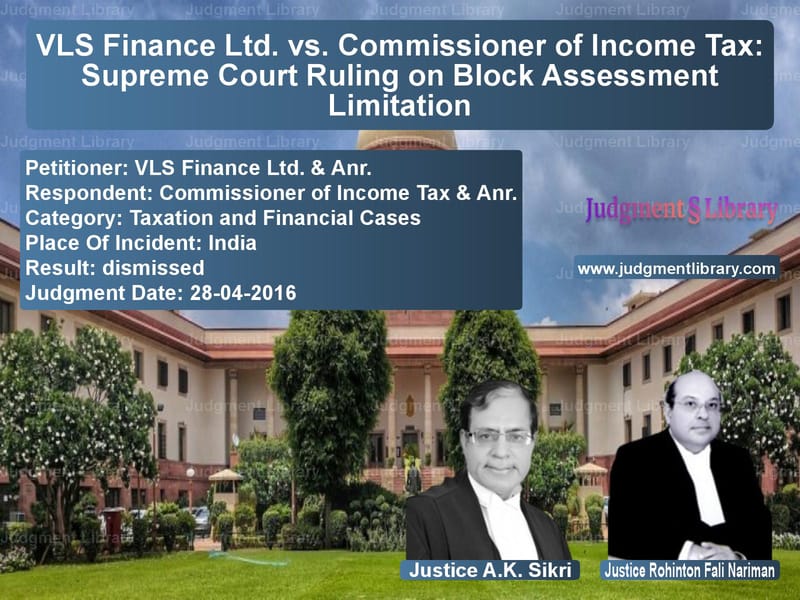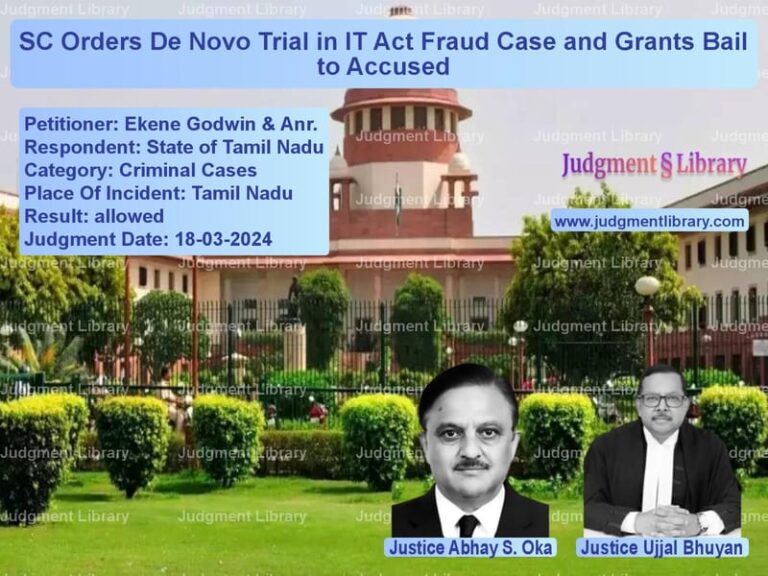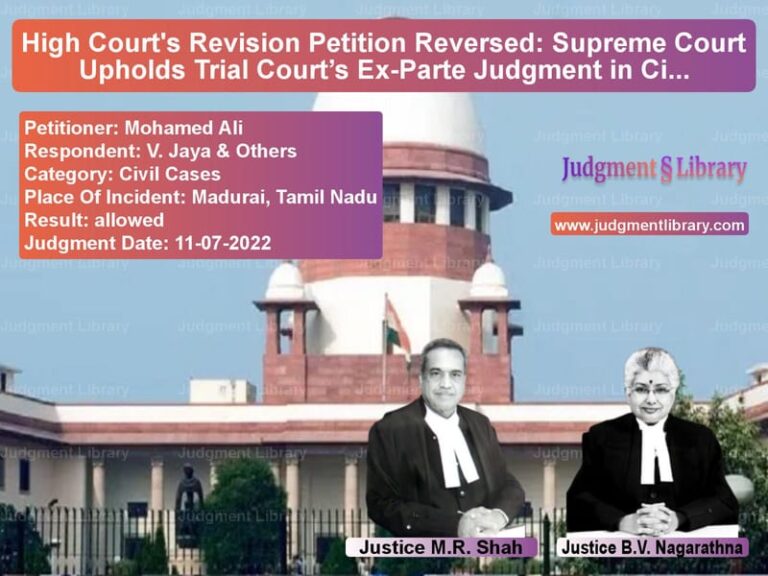VLS Finance Ltd. vs. Commissioner of Income Tax: Supreme Court Ruling on Block Assessment Limitation
The Supreme Court of India, in the case of VLS Finance Ltd. & Anr. vs. Commissioner of Income Tax & Anr., adjudicated on the critical issue of block assessment limitation under the Income Tax Act, 1961. The case primarily revolved around whether the period during which an interim stay was in effect should be excluded when calculating the time limit for completing block assessment proceedings.
Background of the Case
The case stemmed from search and seizure operations conducted on the premises of VLS Finance Ltd. on June 22, 1998, under Section 132 of the Income Tax Act. The searches continued until August 5, 1998. Following this, the Income Tax Department issued a notice under Section 158BC(c) on June 28, 1999, requiring the appellants to file returns for the block period from April 1, 1988, to June 22, 1998. The appellants complied by filing their returns on September 10, 1999.
Legal Issues
- Whether the block assessment proceedings became time-barred under Section 158BE of the Income Tax Act.
- Whether the period between August 24, 2000, and December 15, 2006, during which the High Court’s interim stay on a special audit was in effect, should be excluded from the limitation period.
- Whether the search and seizure proceedings conducted beyond June 22, 1998, were legally valid.
Arguments by the Petitioner
- The petitioners contended that the limitation period for completing the block assessment expired on June 30, 2000.
- They argued that the interim stay granted by the High Court on August 24, 2000, only pertained to the special audit and not to the entire assessment proceedings.
- The appellants asserted that any searches conducted beyond June 22, 1998, were unauthorized and illegal.
- The appellants also questioned the legality of extending the same search warrant multiple times instead of issuing a fresh authorization.
Arguments by the Respondents
- The Income Tax Department argued that the limitation period should be counted from August 5, 1998, when the last search was conducted.
- They maintained that the special audit ordered under Section 142(2A) was an integral part of the assessment process.
- The respondents contended that the period during which the interim stay was in effect should be excluded from the limitation period.
- They also defended the legality of extending the original search warrant.
Supreme Court’s Observations
The Supreme Court examined the legal provisions and past precedents related to block assessments. The key observations were:
- The limitation period under Section 158BE must be calculated from the date of the last search, which in this case was August 5, 1998.
- The Court upheld the principle that when an interim stay affects an integral part of the assessment proceedings (such as a special audit), the period of the stay should be excluded from the limitation calculation.
- The Court found that the continuation of search operations beyond June 22, 1998, was legally valid as per the panchnama records, which indicated that searches were temporarily concluded and resumed later.
Supreme Court’s Ruling
The Supreme Court ruled in favor of the Income Tax Department, holding that:
- The limitation period for completing the block assessment was extended due to the High Court’s interim stay.
- The assessment proceedings were not time-barred as the period between August 24, 2000, and December 15, 2006, was lawfully excluded.
- The search operations conducted after June 22, 1998, were valid, as the search authorization remained in force until the final panchnama was drawn on August 5, 1998.
- The appeal by VLS Finance Ltd. was dismissed with costs.
Key Takeaways from the Judgment
- Impact of Interim Stay on Limitation Period: The ruling clarifies that if an interim stay directly affects an integral part of the assessment process, it can be excluded from the limitation calculation.
- Legality of Search Extensions: The judgment validates the extension of search operations under the same warrant, provided proper documentation is maintained.
- Special Audit as Part of Assessment: The Supreme Court reaffirmed that special audits under Section 142(2A) are a crucial component of assessment proceedings.
- Strict Interpretation of Limitation Laws: The ruling underscores the importance of interpreting limitation laws in a manner that aligns with the objectives of taxation and assessment procedures.
Conclusion
The Supreme Court’s judgment in VLS Finance Ltd. vs. Commissioner of Income Tax establishes a significant precedent in taxation law. It affirms that the period during which an interim stay impacts assessment proceedings should be excluded from limitation calculations. Additionally, it clarifies the legal validity of extending search operations under a single authorization. This ruling strengthens the enforcement of taxation laws while ensuring that procedural delays do not hinder legitimate assessments.
Don’t miss out on the full details! Download the complete judgment in PDF format below and gain valuable insights instantly!
Download Judgment: VLS Finance Ltd. & A vs Commissioner of Inco Supreme Court of India Judgment Dated 28-04-2016-1741854727121.pdf
Direct Downlaod Judgment: Direct downlaod this Judgment
See all petitions in Income Tax Disputes
See all petitions in Tax Evasion Cases
See all petitions in Tax Refund Disputes
See all petitions in Judgment by A.K. Sikri
See all petitions in Judgment by Rohinton Fali Nariman
See all petitions in dismissed
See all petitions in supreme court of India judgments April 2016
See all petitions in 2016 judgments
See all posts in Taxation and Financial Cases Category
See all allowed petitions in Taxation and Financial Cases Category
See all Dismissed petitions in Taxation and Financial Cases Category
See all partially allowed petitions in Taxation and Financial Cases Category







